 Lucy Woodall, husband John and son Trevor
Lucy Woodall, husband John and son Trevor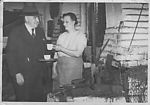 Lucy with the Boss at Stevens'
Lucy with the Boss at Stevens'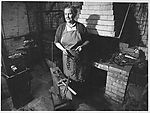 Lucy at her hearth at Woodhouse's
Lucy at her hearth at Woodhouse's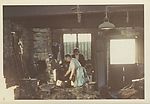 Lucy at the forge at Woodhouse's, photo by Ron Moss
Lucy at the forge at Woodhouse's, photo by Ron Moss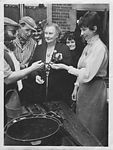 Lucy accepting the Vice Presidency of the Black Country Society, at the Pear Tree Inn, Mincing Lane, Rowley Regis
Lucy accepting the Vice Presidency of the Black Country Society, at the Pear Tree Inn, Mincing Lane, Rowley Regis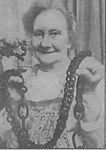 Lucy aged 79
Lucy aged 79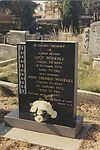 Lucy Woodall's Headstone
Lucy Woodall's Headstone

Lucy Woodall was born in 1899 in Old Hill. She was a young girl at the time of the Cradley Heath women chainmakers' strike in 1910. She had vivid memories of those women and their struggle for a minimum wage. " I can still picture them in my mind, the women coming up Cradley Heath. I was about ten and wasn't yet at work. There was uproar. It was when Macarthur came and they did carry on." (Rob Woolley, "Gi it sum 'ommer") By the time the Cradley Heath Workers' Institute was built in 1912, from the surplus strike funds, Lucy was getting ready to start her life as a chainmaker.
Unlike so many of the chainmakers, Lucy's story has not been lost. Her son Trevor has kindly made available to the Museum his collection of photographs and newspaper cuttings, and Carl Chinn, in collaboration with the Express and Star, has included her story in his book, "Black Country Memoirs", from which much of our information is taken.
Lucy was one of seven children. Her mother made nails in her yard, and her father was a socket maker. Life was hard. John had served in the Boer War, but was invalided out, because of ulcerated feet. Whenever they were particularly bad, he was unable to work.
Lucy was encouraged by her Headmistress at Corngreaves School to take up needlework, because she had proved herself to be very able, but Lucy chose chainmaking. She said, "it was what I wanted and the money was needed at home. So I signed up for an apprenticeship". (Chinn, p71)
At the age of 13, she was taken on at Horton's chain factory in Park Street, Old Hill. For twelve hours a day, five days a week and seven hours on a Saturday, Lucy earned 4 shillings (20p). As in most working homes, the money was needed to help support the family. Lucy kept only 2d (less than 1p) for herself.
Lucy learned her trade from the people she worked with, and after a year was allowed to do "stint" work. The "stint" was the quantity of chain that had to be made in a day, and the working day could not end until the target was reached. Lucy was too talented and hard working a chainmaker ever to have to stay over at the end of the day.
Lucy finished her apprenticeship in 1915 and moved to Elizabeth Perry's chain shop, where she made cavalry chain for the war effort. Two years later she went to William Stevens', and later, in the early 1920s,to Harry Stevens' in Oak Street, Old Hill, where she worked for the next 35 years. For much of the time she made chain for agriculture. In 1950 the Express and Star ran a feature on Lucy as an "Earner of Dollars" as she forged cattle chain for the Canadian and American markets. She even made chain bound for Africa, for use in lion traps.
In 1957 Harry Stevens was bought by Samuel Woodhouse, where Lucy continued to work. In 1961 Sheila Riley of the Express and Star visited Woodhouse's. She wrote, "Sparks are flying everywhere. Hot chains lie on the floors. The clang of the hammers, the roar, the sparks and the ever present danger that a careless blow could cause a lot of damage, doesn't make this workshop one of the most pleasant working places. But Mrs Woodall and her colleagues love the work. They have done it all their lives like their mothers and fathers before them." (Chinn, p.75)
Lucy retired in 1969, but boredom soon sent her back to the forge, to work part-time. As a mark of respect the Black Country Society made her an Honorary Vice President. She finally gave up chainmaking in 1973, when her arthritis made it too painful for her to continue. She had become something of a celebrity, appearing in several television programmes about the Black Country and chainmaking. She was interviewed for radio and numerous articles were written about her. Even after retiring she could not stay idle, and spent much time making "podged" rugs as raffle prizes to raise money for the disabled.
Lucy's life had been hard, and tragic. In 1932 her husband, Jack, contracted pneumonia and died. She became the breadwinner, not only for herself and her son, Trevor, but also for other relatives. Despite this, Lucy was able to look back on her chainmaking days, and say, "They were hard times, but they were happier, a lot happier. We was always singing, especially at night. When it was dark we'd sing the hymn tunes and during the day we'd sing the ragtimes. If I got my time again I'd still go on chain. I used to love it if there came an order we'd never done before. I used to think it was grand." (Chinn, p.75)
Lucy died just before her eightieth birthday. She was a remarkable woman. As Dr. Carl Chinn said , "They were women of whom we should be proud and whose names should be recorded so that those yet to come shall understand them, appreciate them, and never forget them." (Express and Star, March 25th 2004)
Rollover the captions in the box to see the available images in thumbnail format, click the caption to see the full-size image
| Reference: | 679 |
| Keywords: | |
| Archive Ref: | |
| Updated: | Thu 12 Jul 2007 - 1 |
| Interpretation written by | Barbara Harris |
| Author's organisation | |
| Organisation's website |